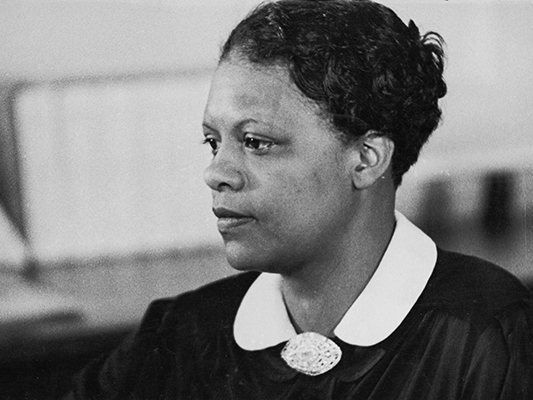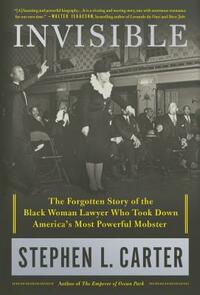Take a photo of a barcode or cover
92 reviews for:
Invisible: The Forgotten Story of the Black Woman Lawyer Who Took Down America's Most Powerful Mobster
Stephen L. Carter
92 reviews for:
Invisible: The Forgotten Story of the Black Woman Lawyer Who Took Down America's Most Powerful Mobster
Stephen L. Carter
informative
inspiring
reflective
medium-paced
Fascinating read — the hook is that this is about the black female lawyer who took down America's most powerful mobster in the 1930s, but the actual book is so obviously a labor of love for the author (who is the eponymous lawyer's grandson). Lots of family history here, and a shorter amount of page space spent on the case that made her famous than I would have expected. Carter's nimble prose and ability to place events of significance to his family in their historical context, however, still made this an interesting, informative, and ultimately moving read. (I may have shed a tear or two at the closing paragraphs of the epilogue, I dunno. THERE'S A LOT OF DUST.)
I enjoyed reading this book. Though I was expecting it to focus mainly on the instance described in the subtitle, it is a comprehensive look at the life of Eunice Hurston Carter. It details her childhood, her rise up the social ladder, and her struggles to meet her ambitions in a world that was not going to give dues easily. I think it is also an important lesson that while odds were stacked against the "darker nation" when it came to personal and professional opportunities in the early 1900s, individuals who had ambition and perseverance could still rise to high levels of power in the United States of America. While we do not learn about them in school, they existed and can teach us a great deal more about our history than our current approach does. People who enjoy biographies and the underdog rising to the top will likely enjoy this book. Lovers of the forgotten side of history will also enjoy it.
This book told an interesting story about an incredibly hard working woman I knew nothing about before reading it.
The history was fascinating. Eunice Carter was a woman of color who became a lawyer in the 1930s. She was hugely influential in the arrest and trial of the mafia mob boss Lucky Luciano. That story was just a cool one to read about no matter what, and she went on to do a lot of other really impressive things as well.
Being written by her grandson, there was interesting family history/drama in there as well. She firmly believed her brother's communist activities were what stalled her career, and it's quite likely that was the case. She also had a strained relationship with her son (the author's father) -- he said he always felt like she didn't know what to do with him so just kept sending him away to live with other relatives (which is much the same way she was raised). So it was interesting to read the balance of intense pride in his family's history tempered with sadness at the lack of closeness.
Being written by her grandson, it *also* had some frustrations for me as a reader. The author made frequent use of such phrases as "She must have felt..." "Surely she felt..." "She must have been thinking.." "Surely it reminded her..." This style of autobiographical writing drives me up the wall. If a person hasn't said what they were thinking or feeling of then we don't know it and I don't want to hear what you imagine would be the case. :P Especially when he talks about how stoic and reticent his grandmother was.
On the whole though, I am really glad I picked this up at the library!
The history was fascinating. Eunice Carter was a woman of color who became a lawyer in the 1930s. She was hugely influential in the arrest and trial of the mafia mob boss Lucky Luciano. That story was just a cool one to read about no matter what, and she went on to do a lot of other really impressive things as well.
Being written by her grandson, there was interesting family history/drama in there as well. She firmly believed her brother's communist activities were what stalled her career, and it's quite likely that was the case. She also had a strained relationship with her son (the author's father) -- he said he always felt like she didn't know what to do with him so just kept sending him away to live with other relatives (which is much the same way she was raised). So it was interesting to read the balance of intense pride in his family's history tempered with sadness at the lack of closeness.
Being written by her grandson, it *also* had some frustrations for me as a reader. The author made frequent use of such phrases as "She must have felt..." "Surely she felt..." "She must have been thinking.." "Surely it reminded her..." This style of autobiographical writing drives me up the wall. If a person hasn't said what they were thinking or feeling of then we don't know it and I don't want to hear what you imagine would be the case. :P Especially when he talks about how stoic and reticent his grandmother was.
On the whole though, I am really glad I picked this up at the library!
I enjoyed this book. I did feel like I would have enjoyed it more if it contained more of the author's memories of his relationship with his grandmother and his father. Eunice Hunton Carter did live a fascinating life. I was sad that some of her relationships suffered and never mended.
Excellent read. Could have been the politics of today I was reading, but it's the early 20th century. Well written, engaging, and fascinating.
I really wanted to like this book. The title really grabs you. The prologue is a great set up. However, although I like learning history trivia, the author offers so much trivia throughout the book that it distracts from the main story.

PHOTO: Eunice Hunton Carter
N.B. Believe it or not, this is a 3rd-4th edit of the previous version!
Like all Black families, the Carters lived with the constant threat of violence in Atlanta. They'd arrived in 1899, coinciding "with the lynching of Sam Hose, a particularly brutal murder that made worldwide headlines, not least because for the next few days you could buy pieces of the mutilated Negro in the city’s shops." In 1906, when Eunice was 7 and her younger brother 3, a mob of white people attacked the epicenter of Black-owned stores and homes, just two blocks from their own home. Perhaps a hundred people were killed; only the victims were prosecuted.
As an established family with enormous influence, the Carters were devoted to the Republican cause. For Eunice, a strict traditionalist, that would never change, even as FDR's New Deal was changing the loyalties of "the darker nation." She went to Smith for her undergraduate degree, and at Fordham got her JD, afterwards putting up her shingle to practice law as a private individual. It did not go well.
But she had another way in--with her family's renown, together with having moved to Harlem and married a successful dentist, she was a budding "Czarina in sassiety," as the author termed the scions of the era. By 1934, the Mob owned New York. In 1935, she ran for district office in NYC and lost--by a landslide. Betting on FDR, her community had overwhelmingly voted Democratic.
A special prosecutor was hired in NY for one year to prosecute organized crime: his name was Thomas Dewey. Dewey hired 20 lawyers to help his prosecutions, and one of them was Eunice Carter. "...[T]he newspapers wrote about her hiring as a payoff to Harlem’s Negroes—as if Dewey had hired nineteen white men on merit and one black woman because he had to." Eunice was assigned to investigate the Women's Court, where careers went to die. But she noticed a trend: all the arrested prostitutes were well rehearsed to answer questions. She also saw that over months, the same lawyer was always there to defend them--and he never lost. This suggested a central overseer. All she needed was a couple of girls wiling to name Lucky Salvatore Luciano, in court, as that overseer. Eventually, Eunice found three mobster girlfriends who'd been present when Luciano carelessly spoke of his involvement. All three were provided ample protection for the duration. All three testified at trial.
"If the jury believed even one of the three women’s testimony, Dewey had his conspiracy." At trial, Dewey was the sole prosecutor. Later, when Eunice expected some reward for her labors, Dewey again assigned her to the Women's Court. Eventually she was head of misdemeanors, another backwater, but less so. There she initiated a juvenile justice system that allowed for release without bail and helped keep kids out of adult jails. Dewey won, and Luciano was sentenced to 30-50 years. (He would later be released early to inform on Communists--his "help" proved fictional.)
When Dewey did turn to the numbers rackets to prosecute the Black-owned so-called policy banks, the newspapers howled: "Harlem was rooting for the fugitive—and against those who were chasing him. As for Eunice, she was suddenly a betrayer." Dewey lost that trial by asking an inadmissible question, a rookie mistake. He was ambitious and impatient, and the loss didn't deter him. After just a year in office, Dewey ran for governor. He took Eunice with him whenever he ventured into a community of color--and always when he visited Harlem. She worked tirelessly on his campaign and spoke at every available venue. She hoped to garner a judgeship when he won. He lost. Again and again, she continued to campaign for Dewey, for governor and a brief time later, for president as well. First he ran against FDR and lost. Next he lost to Truman. Eunice, meanwhile, had been shut out completely. By 1936 she had tired of stumping for the GOP.
Her ambition, however, could not be thwarted. She traveled the world, speaking at every public engagement she could possibly find, all at her own expense. At home, she gave lavish parties to maintain her status as a senior Czarina. She simply swallowed the humiliation of her husband's open cheating and remained in the marriage--exactly as her mother would have demanded. She quietly found another man for herself and both spouses continued to live essentially separate lives under the same roof--although Eunice was traveling more often than not.
Her brother Alphaeus became a thorn in the family's side. He joined the Communist Party, even giving up his professorship at Howard to work for them. For Eunice, this had ramifications: Hoover, then head of the FBI, would have Alphaeus arrested and jailed for refusing to name other Communists. Although Eunice had always held her brother at arm's length and they never spoke again, there was enough of an association to kill her ambitions for good.
"She continued her nearly constant effort to reinvent herself. In March of 1951, she was replaced as the National Council of Negro Women’s official observer at the United Nations. But the change barely slowed her down. Instead, it accelerated her move from the black club world into the white."
Eunice had "...tangled notions of duty that on the one hand she believed in fervently and on the other she knew had always held her back. Gender roles. Racial expectation. Playing the dutiful wife when her husband philandered and she herself was in love with another man; playing the dutiful mother when she had no idea what to do with a child. For regimentation, like dictatorship, comes in many forms; and “the dictator from within” had whispered to Eunice her entire life...she was ambitious at a time and in fields where there were few possibilities for a colored woman to shine. And before we decide that she was too ambitious, we must ask ourselves whether if Eunice had been white and male
and had the same résumé, she would not have gone further in her career. If our answer is even a tentative yes, then to criticize her for ambition amounts to little more than demanding that she stay in her place."
Yet, he also writes,"[S]he kept the world at a distance and wound up with no one to talk to."
I give this non-fiction effort seven stars as an important and utterly neglected piece of history.
A little dry at times but overall a great story. Great history and stories that don’t get the attention they deserve.



